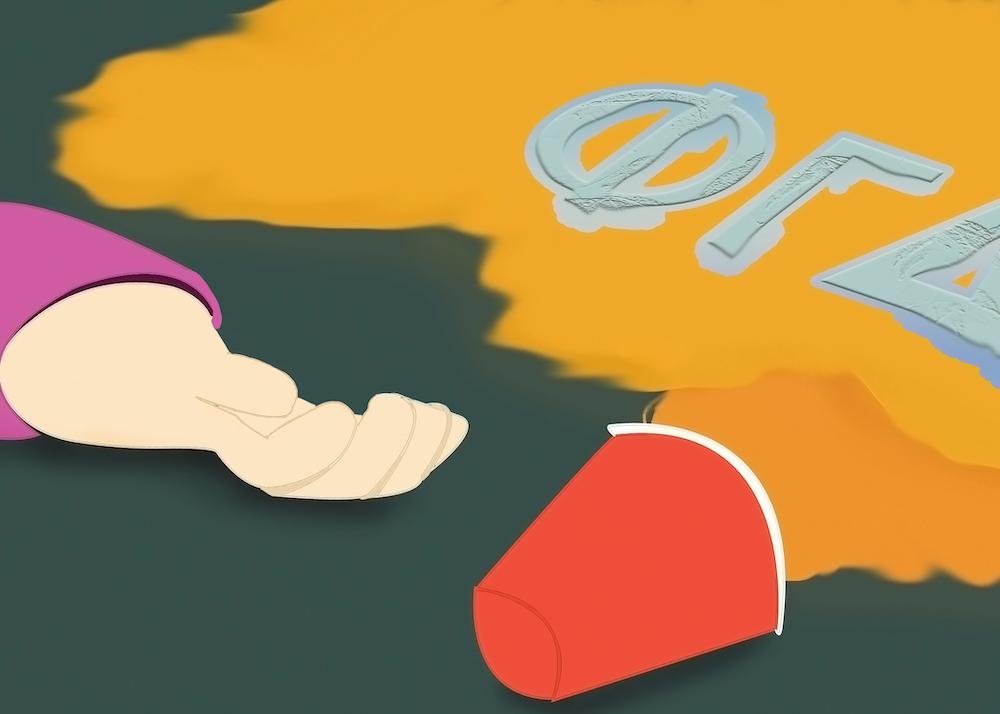Content warning: the following content mentions topics relating to sexual violence.
On Sept. 29, MU students gathered at Speakers Circle to protest relationship and sexual violence. Another protest is scheduled for Oct. 5 advocating for improved student safety, according to the Mizzou Without Sexual Assault Instagram account. Though these protests are not sparking national attention, multiple reports and accounts of sexual assault and harassment on campus have surfaced this school year.
The University of Missouri Police Department released emails in September reporting a sexual assault on Sept. 24 and multiple reports of predatory drugs in drinks. The various reports have led students to look at fraternity and party culture at MU.
Within the past month, various universities across the U.S. saw student protests in response to sexual assault allegations at fraternities. One of the more prominent fraternities facing backlash is Phi Gamma Delta, also known as FIJI.
Petitions circulated and social media pressure increased, focusing attention specifically on the FIJI chapter at the University of Nebraska-Lincoln and the University of Iowa.
At UNL, protests began on Aug. 24, following an alleged sexual assault the night before at the university’s FIJI chapter. On Aug. 25, UNL shut down the chapter as investigations continued. The protests continued at UNL for a week.
At Iowa, protests began on Aug. 31 in response to accusations of FIJI members drugging and raping a student in September of 2020. Protesters are calling for UI to remove the school’s FIJI chapter.
Although no sexual violence allegations are being investigated at the MU FIJI chapter, a member of Greek life said they heard warnings about the fraternity from others within their Greek organization, and said they are wary about visiting the house.
“I’ve always just heard mostly to stay away from FIJI,” the member said. “I don’t have any actual evidence, but there is a saying called ‘Don’t drink the FIJI water,’ which is usually surrounding guys spiking drinks.”
The member said they learned about the protests and started following the @shutdownfiji account on Instagram in late August. After reading about the accounts and investigations, they said they felt there was more than enough evidence to the claims and, therefore, college administrations should hold the houses accountable.
“I definitely think [the protests] were necessary and effective because schools love to just suspend the fraternities — not kick them off — which happened in 2017 at UNL,” the member said. “Change doesn’t really happen with that. So the protests were finally like, ‘Take a look at the president of the university; why is nothing happening?’”
Thomas Shultz, MU FIJI vice president and treasurer, said he joined FIJI for the community. He said his experience within the fraternity has been positive and that he has enjoyed the activities and friendships he made.
Shultz said he supports the protests at UNL and UI, but emphasized that MU’s chapter has no affiliation with those chapters.
“We’re really connected by name only,” Shultz said. “It’d be like saying that somebody from the National Honor Society here is responsible for the National Honor Society at Iowa or Nebraska: While you’re in the same organization, you don’t know each other.”
Outside social media, Shultz said he has not heard any complaints of members spiking drinks. However, Shultz said that, if a Title IX violation occurred, he and others in the house would take immediate action.
As an executive member of the fraternity, Shultz said he wants to use his position to help change the stigma around FIJI and Greek Life in general.
“We want to help make Greek Life as a whole change that notion that it’s an unsafe place filled with bad dudes who are just trying to take advantage of people,” Shultz said. “From my experience, almost everybody that I’ve met in Greek Life doesn’t fit that category.”
The Interfraternity Council governs the fraternities on campus. The IFC oversees and helps coordinate events like recruitment and submitting budget reports. The IFC also monitors if fraternities follow sanctions and penalties.
According to senior Nathan Wild, IFC’s vice president of judicial procedures, the IFC Judicial Board helps decide on smaller, more informal matters, like not registering an event or submitting a guest list, whereas bigger issues, including Title IX reports and hazing, go through a formalized reporting system on the university level.
Students who need to report matters or receive help can report incidents through a form on the Student Accountability and Support website, through the direct Office of Student Accountability and Support in the MU Student Center or through administrators and student organizations.
MU spokesperson Stephanie Fleming reported information on receiving help through the Relationship and Sexual Violence Prevention Center in a statement.
“The RSVP Center provides support to those experiencing intimate partner violence,” Fleming said in the statement. “The center can provide case management services as well as legal and medical advocacy. The center also engages in conducting preventive educational services.”
For complaints against fraternities or sororities, Fleming said the Office of Student Accountability and the Office of Fraternity and Sorority Life will work together on investigations. The sanctions range from warnings to a withdrawal of recognition, meaning the organization would be temporarily or permanently removed.
Currently, FIJI at MU is not facing any official reports or allegations concerning sexual assault or harassment.
“If there’s any sort of disrespect that came from our house, we’ll remove members,” Shultz said. “And that’s something we take very seriously. If there’s truth to a claim, [that behavior and disrespect] does not belong in FIJI or anywhere else.”
Edited by Emmet Jamieson | [email protected]








